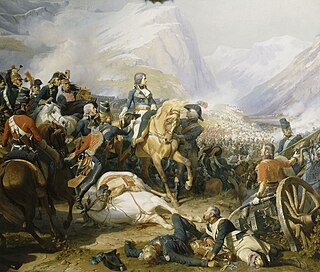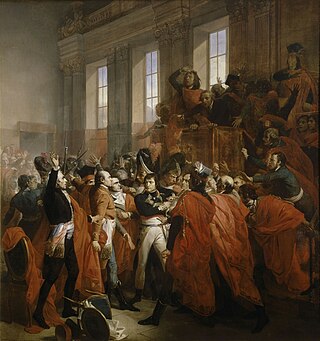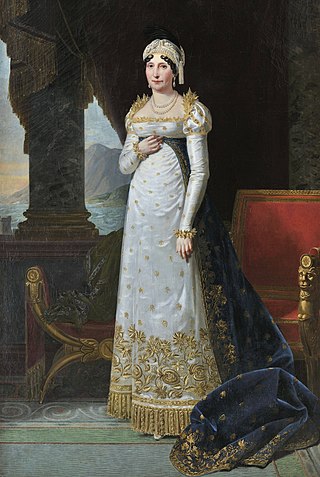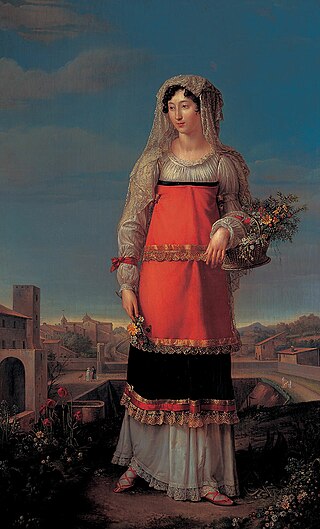
Lucien Bonaparte, 1st Prince of Canino and Musignano, was a French politician and diplomat of the French Revolution and the Consulate. He served as Minister of the Interior from 1799 to 1800 and as the president of the Council of Five Hundred in 1799.

Napoleon III was the first president of France from 1848 to 1852, and the last monarch of France as the second Emperor of the French from 1852 until he was deposed on 4 September 1870.

Napoleon Bonaparte, later known by his regnal name Napoleon I, was a French military officer and statesman who rose to prominence during the French Revolution and led a series of successful campaigns across Europe during the French Revolutionary and Napoleonic Wars from 1796 to 1815. He was the leader of the French Republic as First Consul from 1799 to 1804, then of the French Empire as Emperor of the French from 1804 to 1814, and briefly again in 1815.

The Battle of Rivoli was a key military engagement during the War of the First Coalition in the vicinity of the village of Rivoli, then part of the Republic of Venice. The outnumbered French Army of Italy commanded by General Bonaparte decisively defeated the attacking Austrian army commanded by General of the Artillery Jozsef Alvinczi, who was attempting to march south in a fourth and final attempt to relieve the siege of Mantua. Rivoli further demonstrated Napoleon's capability and deftness as a military commander and led to the Austrian surrender of Mantua in February and French consolidation of northern Italy, ultimately resulting in France's victory over Austria in the war later that year. The Battle of Rivoli marked the climax of Napoleon's Italian campaign of 1796-1797, after which a French victory was inevitable.

The Consulate was the top-level government of France from the fall of the Directory in the coup of 18 Brumaire on 9 November 1799 until the start of the French Empire on 18 May 1804. By extension, the term The Consulate also refers to this period of French history.

Filippo Antonio Pasquale de' Paoli was a Corsican patriot, statesman, and military leader who was at the forefront of resistance movements against the Genoese and later French rule over the island. He became the President of the Executive Council of the General Diet of the People of Corsica and wrote the Constitution of the state.

The Coup of 18 Brumaire brought Napoleon Bonaparte to power as First Consul of France. In the view of most historians, it ended the French Revolution and would soon lead to the coronation of Napoleon as emperor. This bloodless coup d'état overthrew the Directory, replacing it with the French Consulate. This occurred on 9 November 1799, which was 18 Brumaire, Year VIII under the short-lived French Republican calendar system.

The War of the Second Coalition was the second war targeting revolutionary France by many European monarchies, led by Britain, Austria, and Russia and including the Ottoman Empire, Portugal, Naples and various German monarchies. Prussia did not join the coalition, while Spain supported France.

The Council of Five Hundred was the lower house of the legislature of the French First Republic under the Constitution of the Year III. It operated from 31 October 1795 to 9 November 1799 during the Directory period of the French Revolution.

The Constitution of the Year VIII was a national constitution of France, adopted on 24 December 1799, which established the form of government known as the Consulate. The coup of 18 Brumaire had effectively given all power to Napoleon Bonaparte, and in the eyes of some, ended the French Revolution.

Bonapartism is the political ideology supervening from Napoleon Bonaparte and his followers and successors. The term was used to refer to people who hoped to restore the House of Bonaparte and its style of government. In this sense, a Bonapartiste was a person who either actively participated in or advocated for conservative, nationalist, monarchist, and imperial political factions in 19th-century France.

Paula Maria Bonaparte Leclerc Borghese, better known as Pauline Bonaparte, was an imperial French princess, the first sovereign Duchess of Guastalla, and the princess consort of Sulmona and Rossano. She was the sixth child of Letizia Ramolino and Carlo Buonaparte, Corsica's representative to the court of King Louis XVI of France. Her elder brother, Napoleon, was the first emperor of the French. She married Charles Leclerc, a French general, a union ended by his death in 1802.

Maria-Letizia Bonaparte, known as Letizia Bonaparte, was a Corsican noblewoman and the mother of Napoleon I of France. She received the title "Madame Mère" due to her status as the Emperor's mother.

A referendum concerning the establishment of the French Empire was held in France in June 1804. The result showed a virtually unanimous French electorate approving the change in Napoleon Bonaparte's status from First Consul to Emperor of the French, although the votes are assumed to have been manipulated.

A referendum ratifying the new constitution of the Consulate, which made Napoleon Bonaparte First Consul for life, was held on 10 May 1802. The question asked to the voters was: "Should Napoleon Bonaparte be consul for life?". Out of an electorate of 7 million, 3,653,600 voted in favor, and 8,374 voted against.

A referendum on re-establishing the Empire was held in France on 21 and 22 November 1852. Voters were asked whether they approved of the re-establishment of the Empire in the person of Louis Napoléon Bonaparte and family. It was approved by 96.9% of voters with a 79.8% turnout. As with other plebiscites under Napoleon III, the results were rigged and only served to legitimize their rule under a false sense of democracy.

A referendum was held in France on 20 and 21 December 1851. Voters were asked whether they approved of the continuation of the authority of Louis Napoléon Bonaparte and to delegate the powers required to produce a new constitution. It was approved by 92% of voters with an 81.7% turnout.

The First French Empire or French Empire and also known as Napoleonic France, was the empire ruled by Napoleon Bonaparte, who established French hegemony over much of continental Europe at the beginning of the 19th century. It lasted from 18 May 1804 to 4 April 1814 and again briefly from 20 March 1815 to 7 July 1815, when Napoleon was exiled to St. Helena.

Filistine Charlotte Bonaparte Gabrielli was a French Napoleonic princess and the eldest daughter of Lucien Bonaparte and Christine Boyer. She became princess Gabrielli following her marriage to Mario Gabrielli, prince of Prossedi and Roccasecca, Duke of Pisterzo. In Italy, she was known as Carlotta.
Dermide Louis Napoléon Leclerc was the only child of Pauline Bonaparte and her first husband, French Army general Charles Leclerc. Through his mother, Dermide was a nephew of the future Emperor Napoleon I.
















